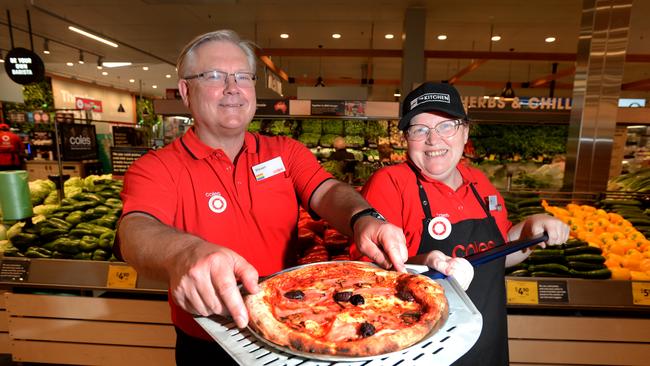Coles boss Steven Cain says the retailer will benefit from the easing of restrictions and the return to city by office workers
Keeping its stores Covid-safe cost $30m in January alone as Omicron spread, but Coles expects sales to rise as the economy opens up and consumers learn to live with Covid.

Coles has emerged in a position of strength after the most disruptive shocks to its business since the pandemic emerged in late 2019, and is now predicting continued recovery in the Australian economy, led by a confident consumer with plenty of pent-up savings to splash around at the shops.
Chief executive Steven Cain said petrol volumes at his convenience stores were picking up as people began to move around after the threat of Omicron began to wane in January, and he expected shopping centres to “come back to life” in coming months.
Inflation was a looming threat, but Mr Cain has pledged to maintain Coles’ competitiveness, saying protecting consumers from bill shock is his “No.1 priority”.
On Tuesday Coles unveiled a 2 per cent fall in its interim net profit to $549m as sales from its supermarkets, liquor stores and Express convenience sites rose 1 per cent to $20.59bn.
Analysts greeted the results as “solid” and in line with market expectations, with gross margin gains in supermarkets and liquor cushioning earnings from higher Covid-19 costs, which hit $150m for the half.
Mr Cain, who described the last six months of 2021 as the most challenging for the retailer since Covid-19 began, due to staff and stock shortages and the arrival of the Omicron strain, said there were signs of improvement in February.
“There are lots of signs that things are returning to normal, there’s more people on the streets, there’s more in shopping centres, there’s more at cafes and restaurants – if they can find the right number of chefs and waiters – and so on,” Mr Cain said.
“All the signs are there. You know, the school run is back. So there’s lots of evidence to suggest that things are getting back to normal but it will never be quite the same, because there will be ongoing work from home.”
Australians now had more than $200bn in pent-up savings, Mr Cain noted, and while he did not think Coles and the food and grocery sector would be able to grab a greater slice of that than normal, consumers had developed a taste for home cooking.
The opening of international borders with an influx of immigrants and skilled workers would complement the economic revival.
“There’ll be a few ups and downs, and in broad terms we know from the last time that the economy opened up and restrictions ease that we are the beneficiary of local shopping,” Mr Cain said.
“We expect as (stock) availability improves the shopping centres will come back to life and all of those things are beneficial to Coles.
Pre-tax earnings of $975m, down 4.4 per cent, were affected by higher Covid-19 disruption costs, travel restrictions and business transformation project costs.
The retailer’s ‘‘Smarter Selling’’ cost efficiency program delivered benefits in excess of $100m in the half and is on track to deliver over $200m in 2022.
As foreshadowed at the first-quarter sales results, Covid-19 impacted Coles’ capital expenditure program. Coles now expects capital expenditure in 2022 to be between $1bn to $1.2bn, previously $1.2bn to $1.4bn.
Meanwhile, for the first half across its three key divisions, sales at supermarkets rose 2 per cent to $18.582bn, liquor sales were up 2.6 per cent to $2bn and Express sales fell 8.1 per cent to $615m as government travel restrictions hurt petrol volumes.
Coles supermarkets posted a 0.8 per cent fall in earnings to $896m, earnings at its liquor chains such as First Choice and Vintage Cellars fell 4.8 per cent to $99m and Express earnings slumped 62.5 per cent to $12m.
Coles declared a fully franked interim dividend of 33c per share, flat on last year, and payable on March 31.
MST Marquee analyst Craig Woolford said he expected small upgrades to earnings and a positive share price reaction to the result given concerns about Covid-19 costs leading into it.
“Coles has delivered a solid result, particularly in light of fears about escalating Covid-19 costs putting a major dent in earnings. The company’s sales trends compared with industry growth continue to improve and we expect a rerating higher given its substantial price to earnings ratio discount to Woolworths.”
Coles shares closed up 3.2 per cent on Tuesday at $17.27.








To join the conversation, please log in. Don't have an account? Register
Join the conversation, you are commenting as Logout